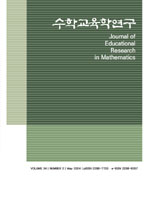학술논문
Mathematical, experimental and metaversal approaches to catenoid in geometry education
이용수 69
- 영문명
- Mathematical, experimental and metaversal approaches to catenoid in geometry education
- 발행기관
- 대한수학교육학회
- 저자명
- 서민혜(MinHye Seo) 이동선(Dongsun Lee)
- 간행물 정보
- 『수학교육학연구』제34권 2호, 171~185쪽, 전체 15쪽
- 주제분류
- 사회과학 > 교육학
- 파일형태
- 발행일자
- 2024.05.30

국문 초록
영문 초록
The catenoid is formed between two coaxial circular rings and is mathematically classified as a minimal surface. The shape of the catenoid is very interesting and can be used for educational purposes as it explains curvatures and equilibrium shapes in nature. There are many interesting ways to create a catenoid with two ends, i.e. mathematical, experimental and metaversal approaches. This paper details the mathematical formulation and then creates and observes the catenoid for mathematics education. We also provide a tutorial video to create and observe the catenoid in the metaverse. This paper explores the mathematical properties of the catenoid for educators and highlights its use in experiments and virtual environments for educational purposes. Geometric surfaces have been studied extensively from a mathematical perspective. Mathematical concepts are physically invisible but difficult to understand because a mathematical surface has no volume and no mass. The catenoid is a minimal surface found in nature (e.g. soap films). This surface, classified as a minimal surface, can be understood through simple calculus and remains a subject of ongoing research in the field of differential geometry as one of the problems related to the classification of minimal surfaces. In mathematics education, the catenoid can motivate studies from basic calculus to differential equations, mathematical analysis and geometry. The aim of this paper is to mathematically explore the catenoid, which can be used in different ways depending on the objectives of the educator or the different levels of learning, and to inform educators about its application in experiments and computer simulations within virtual environments.
목차
I. INTRODUCTION
II. THEORETICAL BACKGROUND
III. METHODS
IV. RESULTS
V. DISCUSSION AND CONCLUSION
CONFLICTS OF INTEREST
ACKNOWLEDGEMENTS
REFERENCES
키워드
해당간행물 수록 논문
참고문헌
최근 이용한 논문
교보eBook 첫 방문을 환영 합니다!

신규가입 혜택 지급이 완료 되었습니다.
바로 사용 가능한 교보e캐시 1,000원 (유효기간 7일)
지금 바로 교보eBook의 다양한 콘텐츠를 이용해 보세요!



